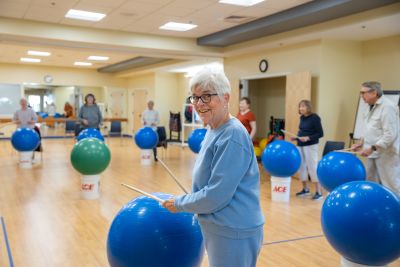 As older adults consider their options for living out their golden years, the decision often comes down to remaining at home or transitioning to a retirement community. For many seniors, it’s understandably tempting to simply stay put, age in place, and continue living as they always have.
As older adults consider their options for living out their golden years, the decision often comes down to remaining at home or transitioning to a retirement community. For many seniors, it’s understandably tempting to simply stay put, age in place, and continue living as they always have.
However, it’s not always the best approach for long-term well-being, or even for maintaining independence. Retirement communities, which offer specialized amenities and a built-in social environment, can provide a higher quality of life and more predictable access to supportive services. Continuing care retirement communities (CCRCs) in particular allow you to tailor services to your evolving needs right on campus, without the need to find a new community for advanced care.
If you’re deciding between aging in place vs. CCRC living, here are some important factors to consider.
The Hidden Challenges of Staying Put
Staying at home as you age can come with serious downsides, so it’s wise to consider whether you can realistically overcome them.
Safety Concerns
Staying in your home will likely require you to make aging in place home modifications, procure home care, or both. But even these may not be enough to fully support your changing needs. You’ll still have increased home maintenance responsibilities over time, and the various services you’ll need to make aging in place workable can come with unpredictable costs. While some older adults thrive in a familiar environment, others encounter difficulties when mobility declines or when managing the home becomes overwhelming.
Mental Health Concerns
In addition, studies suggest that staying home may lead to isolation, which can have very negative impacts on mental and physical health. Limiting daily interaction with others may mean fewer opportunities for sharing meals, engaging in exercise groups, or attending organized social events — all factors that help maintain vitality and overall happiness.
The Advantages of Moving Into a Retirement Community
Here’s how retirement communities can help you live a worry-free lifestyle.
Improved Socializing Opportunities
Retirement communities create an environment that actively encourages social connections. Instead of struggling to find company, seniors can easily join group activities, educational programs, fitness classes, and communal meals. These built-in social opportunities often lead to a richer social life, enhanced emotional well-being, and increased motivation to stay active.
Retirement communities also foster relationships across a wide range of interests, whether it’s gardening clubs, book discussions, or art classes. This readily available social network can significantly reduce loneliness. In essence, moving to a retirement community can connect older adults with a ready-made community of peers, all within a short walk from their front door.
Simplified Living and Maintenance-Free Lifestyles
One of the key benefits of joining a retirement community lies in freeing oneself from the burdens of home upkeep. These communities assume responsibilities for indoor and outdoor maintenance. Residents need not worry about repairing leaky roofs, mowing lawns, or arranging for urgent household repairs. This reduced stress can lead to greater peace of mind, more time for leisure activities, and a safer, more comfortable environment.
Even modifications for accessibility, often necessary to remain at home, become the community’s responsibility rather than the individual’s. This means that everything from walkway safety features to common area lighting is maintained by professionals, removing the guesswork and ongoing costs that accompany home renovations.
Predictable Costs and Comprehensive Care Options

When aging at home, costs for in-home care, emergency repairs, and other surprise expenses can stack up. Retirement communities often provide a clearer picture of monthly costs, including meal plans, wellness programs, and access to on-site medical care.
CCRCs (also called life plan communities) integrate a variety of support levels — from independent living to skilled nursing — right on campus. Instead of scrambling to hire home health aides or coordinate with a distant assisted living facility, residents can simply transition within the same community. This predictability of care and cost makes long-term planning far less stressful.
Empowering Yourself With the Right Choice
Ultimately, deciding where to spend your golden years is a highly personal decision. You should factor in your current health status, family support system, financial resources, and lifestyle preferences.
By choosing a retirement community, older adults can find themselves stepping into a lifestyle that supports all aspects of their health and happiness. Rather than worrying about how they’ll address changing needs and expenses, they can focus on enjoying their days surrounded by neighbors, convenient amenities, and dedicated staff. This environment helps ensure a more secure, fulfilling, and stress-free chapter of life.
Enjoy Your Golden Years Wisely With RWC
Rappahannock Westminster-Canterbury is a continuing care community providing the highest quality living experience for discerning senior adults. Situated on 165 beautiful acres outside the village of Irvington in Virginia’s Northern Neck, RWC residents choose to live here for the independent and worry-free lifestyle afforded in a tranquil setting as well as a wide variety of wellness resources.
As a CCRC, we offer the best of all worlds with independent living, assisted living, and licensed nursing care on site. With our Total LifeCare program, we’ve added the security of lifetime residency and pre-arranged health care services. Should the need for skilled care arise, the only charges over the monthly fee for an apartment or home would be for additional meals and support services.
If you decide to stay at home but need help with some everyday tasks, RWC can help. Our At Home with RWC department delivers personal care, companion care, or nursing care right to your doorstep. All services are monitored by a registered nurse. Enrollees pay a fee to participate in the program. Go to athomerw-c.org to learn more.
Contact us today for lunch and a tour of our beautiful campus. Alternatively, request a brochure to learn more about helping your loved one live their best life at RWC!
